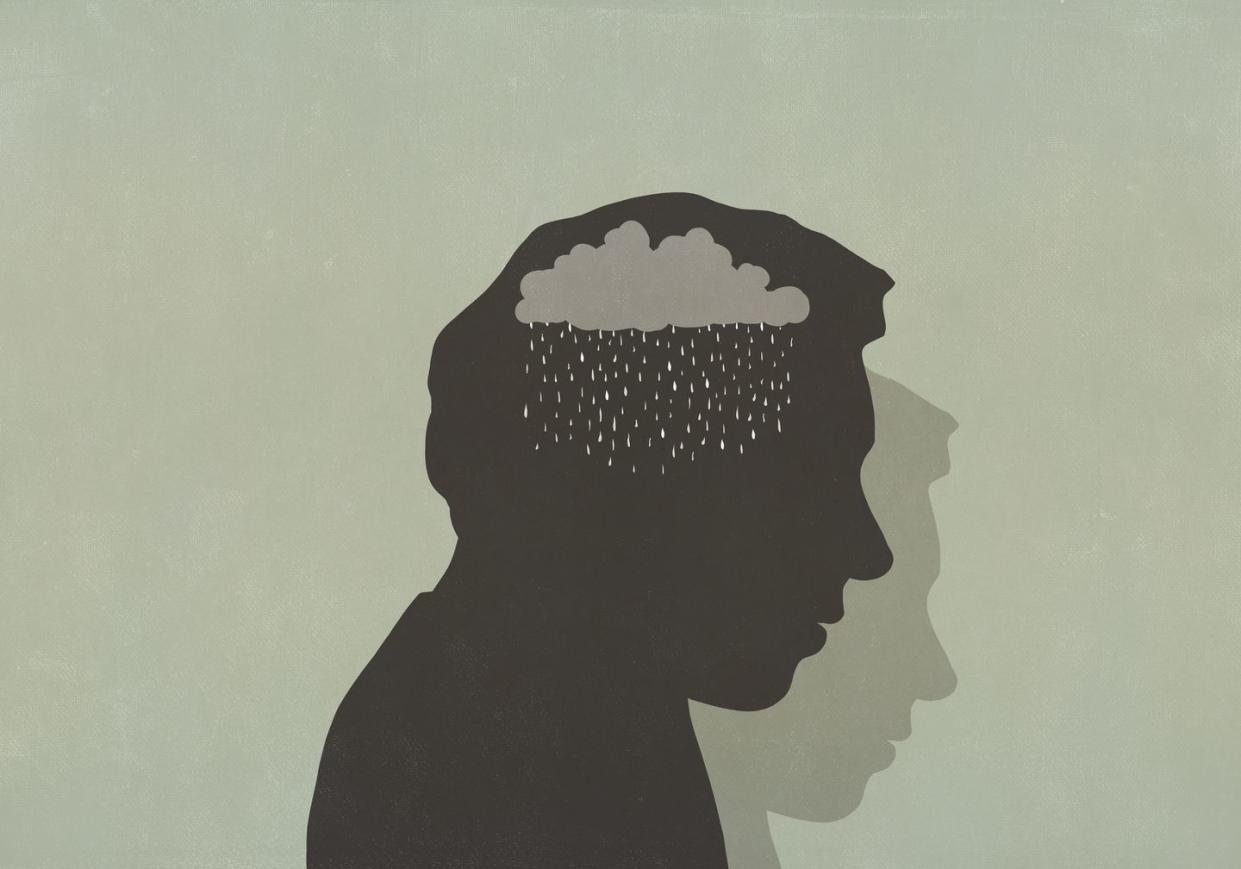How to Tell If You Have High-Functioning Anxiety

"Hearst Magazines and Yahoo may earn commission or revenue on some items through these links."
In today’s post-pandemic, highly divisive, social-media-fueled world, we all may be walking around with a little bit of anxiety. And that is perfectly okay. In fact, experts stress that anxiety is evolutionary important—it’s a warning sign that something dangerous may be afoot, and you need to take action to protect yourself.
But here’s what’s not okay: You go about your day, get up and dressed in the morning, finish all your projects at work, make dinner for your family, have the appearance of a well-adjusted, functioning adult. But inside your head, you’re riddled with fears, what-ifs, and negative thoughts. You're functioning, maybe even killing it, but still dealing with a high level of anxiety.
“People who have an anxiety disorder might be able to function at work, in a relationship, at parenting — they can even go out and appear to be enjoying themselves,” says psychiatrist Gail Saltz, MD, clinical associate professor at New York Presbyterian Hospital, Weill-Cornell Medical College and the author of The Power of Different. “But are they really functioning at their highest level? I would say no.”
Because inside that calm exterior there is an inner monologue telling a different story. “If you stuck a microphone in their brain, you would hear all kinds of anxious thoughts going on,” says psychologist Elizabeth Lombardo, PhD, author of Get Out of the Red Zone. Those whirling thoughts can be anything from, “I’m barely keeping up, it’s all going to fall apart,” to “no matter how much I do, I’ll never be good enough.”
There are therapy apps and online support groups at your disposal. Visit mhanational.org if you're in crisis, and in emergencies, call the National Suicide Prevention Lifeline at 800-273-TALK or text "NAMI" to 741-741.
While rates of anxiety increased about 25% in the first year of the pandemic, they are still elevated, and people continue to feel stressed and anxious. According to a recent poll by the American Psychiatric Association, at the end of 2022, 37% of Americans rated their mental health as fair or poor, up from 31% the year before. In addition, 26% expected to experience more stress in 2023 than they had the year before.
“Anxiety disorders are still amongst the most common disorders,” says Dr. Saltz. Fortunately, they are also amongst the most treatable, she says.
What is high-functioning anxiety?
More than 40 million adults in the U.S. have an anxiety disorder. There are many factors that can lead to an anxiety disorder, including genetics and living through a traumatic experience, such as abuse, death of a loved one or a prolonged illness.
Though anxiety is generally defined as persistent, excessive fear or worry in situations that are not actually threatening, there are several different categories of anxiety — any of these can be “high functioning” as long as the person is able to go about their daily life mostly unimpeded. These can include:
Generalized Anxiety Disorder: Fear or extensive worries about everyday life.
Social Anxiety Disorder: Irrational worries about interacting with other people; constantly worrying you will say or do the wrong thing and others will judge you for it.
Phobias: Irrational fears of specific triggers, such as dogs, germs, flying, heights, crowded spaces, etc.
For those with high-functioning anxiety, the juggling act of keeping up outside appearances while struggling internally can add an extra layer of distress: You’re scrambling to keep the perfect façade going, the perfect social media profile, perfect relationship, while inside you are constantly panicking that it will all fall apart.

“The anxiety can become all-encompassing, where it feels like failure is just around the corner unless the person is keeping up with these extremely high standards,” says clinical psychologist Joshua Magee, PhD, founder of Wellness Path Therapy.
Signs
Even if your coworkers or the other parents in the carpool lane don’t suspect anything is wrong, you can be suffering from many anxiety symptoms, including:
Persistent worry: “This could be in the form of thoughts that just circulate much of the day,” says Saltz. You could be always waiting for that other shoe to drop: What if that little bump is something cancerous? What if my boss realizes I don’t know what I’m doing? What if there’s an earthquake or another pandemic…
Physical problems: Anxiety can have a negative effect on your body, causing fatigue, aches and pains, muscle tension and even gastrointestinal issues, such as diarrhea. “Some people may have a pit in their stomach they’re not digesting food as well,” says Lombardo. “For others, it may be headaches or an inability to sleep.”
Nerves on edge: “You might feel like your heart is beating fast and you're sweating, or you may get this feeling that some people describe it as like a whoosh or ping or feeling as if somebody had just startled them,” says Saltz.
Difficulty concentrating: No matter how hard you try to focus, you may be easily distracted.
Irritability: You may have a shorter fuse when dealing with your partner or children (and they, in fact, may be the first to notice that things are not actually okay with you, no matter how brave a front you put on).
Panic attacks: These can come on suddenly, involving heart palpitations, shortness of breath, chest pain, and sweating. “You feel like you’re going crazy, like you’re going to die, but it only last for 10 or 15 minutes,” says Dr. Saltz. But once you recover, you may have a constant fear about when it’s going to happen again, she adds.
High-functioning vs. other types of anxiety
To be clear “high functioning” is just a way to describe how someone deals with an anxiety disorder. The one factor that makes it a little different than typical anxiety is that people who are “high functioning” meet their challenges head-on rather than avoiding them, which is a hallmark of anxiety, says Magee. “Typically, anxiety is accompanied by this strong urge to avoid whatever is making us anxious,” he says. “We tend not to want to do the things that make us feel bad. But with high functioning anxiety, people may be tolerating the situations that are stressful to them, like work, rather than calling out for a sick day or talking to others about just how stressful their job is.” Some people with high-functioning anxiety may also develop a habit of focusing so much on areas of improvement that they don't take time for self-care and relaxation.
Ease symptoms
As mentioned before, some anxiety is helpful — think about the shot of adrenaline you get before giving a speech or the "danger" signal that tells you to pay more attention when you're driving on an icy road. But there are some red flags to pay attention to, that tell you your anxiety has ratcheted up to harmful levels. "If you notice you are having negative thoughts that you just can't contain, if you are really overthinking everything and having intrusive thoughts that cause you distress, then it's worth seeking professional help," says Marni Amsellem, PhD, a psychologist at Smarthealthpsych.com. She points out that other red flags include physical symptoms of distress, and relying more and more on unhealthy coping strategies, like alcohol, marijuana or binge-eating.
Some ways you can help ease the anxiety on your own:
Take care of yourself: It can seem like you're running on high speed 24/7 just to keep everything from falling apart, but self-care is a big part of dealing with anxiety. Make sure you are getting enough sleep, eating regularly scheduled, nutritious meals, exercising and taking breaks for stress relief strategies, such as meditation, yoga,or walking.
Get the thoughts out of your head and onto paper: Journaling is a helpful way to manage negative thoughts, says Lombardo. "A lot of times our thoughts are not very accurate, but we're reacting to them emotionally as if they're true," she says. Once you see them written down, you can have a clearer idea of whether they are worth stressing about—and if they're not, you can crumple up the paper and throw those thoughts away.
Have spontaneous breaks for fun: When you're trying to keep it all together, taking off a few hours to see a silly movie in the middle of the day or to meet a friend's adorable new puppy may seem like a waste of time, but it can do wonders for your mindset, says Magee. "In our current milieu, it seems like a lot of adults don't have a lot of chances for spontaneous pleasure," he says. "When we're able to just take chances with our life, on the one hand, it could be fun, but it also teaches our brains an important lessons that even without planning and overthinking, things often turn out better than we expect."
Try self-help: Reading books about anxiety can give you some tools to use in your daily life to dial down negative thoughts. You should also consider whether there is a legitimate source of anxiety in your life—like a toxic friend— that needs to be addressed.
Professional treatments
If your anxiety has progressed to a point where lifestyle changes are not helping, or it's getting even worse, ask your health care provider for a referral to a therapist or psychiatrist, who can work with you to manage your symptoms. Remember, anxiety it a serious disorder, so be wary of quick fixes, warns Dr. Saltz. "There is a lot of misinformation about mental health issues on social media," she says. "Someone pointing to words on Tiktok is not a legitimate treatment." A mental health professional can talk you through science-backed treatments, such as:
Cognitive Behavioral Therapy (CBT): The most extensively researched method for treating anxiety, CBT teaches you how to reframe your negative thoughts, and it can also help you identify major stressors in your life and work on skills to address it. “In CBT, therapists help clients consider new ways of thinking about their anxiety, engage with their social supports, and learn relaxation techniques,” says Magee.
Psychodynamic therapy: Unlike CBT, which usually involves a shorter number of sessions, psychodynamic therapy can last longer, but it can be extremely effective, says Dr. Saltz. “It’s basically looking at the unconscious conflict that may be driving anxious thoughts," she explains.
Anti-anxiety medication: “In the first couple of therapy sessions, if it's clear you aren't really able to take in and start using the tools, then you might need medication to take down the anxiety levels enough that you can learn the therapy,” says Dr. Saltz. Your doctor may prescribe a selective serotonin reuptake inhibitor (SSRI) or another type of anti-anxiety medication.
Bottom line: Any anxiety disorder, including the "high-functioning" type, should be taken seriously—though you should remember that some anxiety is part of the healthy human experience. There are many treatment options available, depending on your needs. It's also important to remember that you are not alone.
You Might Also Like
